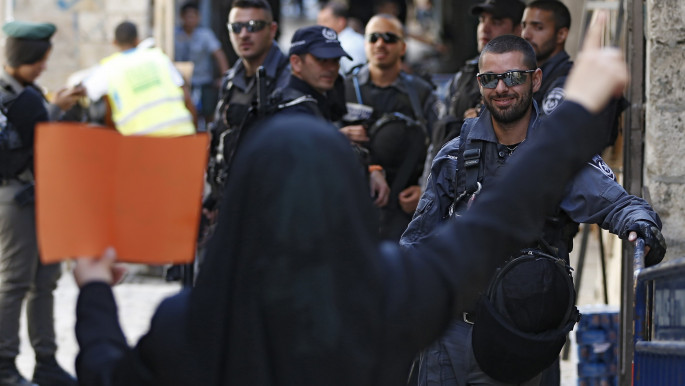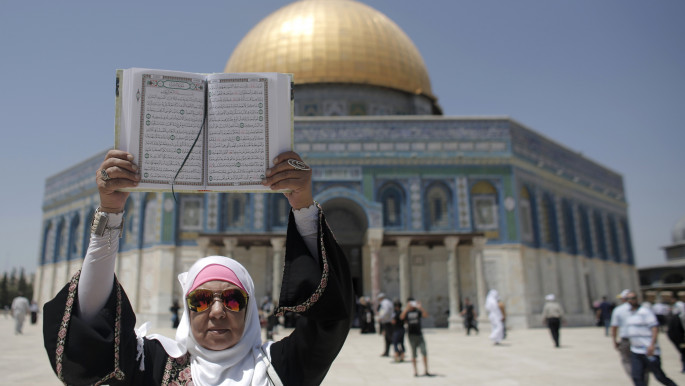The steadfast women of al-Aqsa
Israel's latest 'blacklist' has banned 40 Palestinian women from entering the al-Aqsa Mosque following small protests this week, but it has done very little to conquer their morale as they vow to continue to defend the compound.
"I have been banned six times, for a total period of ten months within two years," Hanady Halawani nonchalantly says. She is one of the names on Thursday's ban list. "This is not anything new," she adds.
Halawani, alongside a group of Palestinian women, has been protesting for nearly two weeks after being prevented from entering al-Aqsa Mosque in Jerusalem's Old City, following a ban placed by Israeli authorities.
The women hold signs reading "It is my right to pray in al-Aqsa" as they chant in unison. "You ask who we are? We are the women of Palestine. You ask who we are? We are not terrorists."
 |
You ask who we are? We are the women of Palestine. You ask who we are? We are not terrorists |  |
The group of women, commonly referred to as Murabitat ["steadfast"], have taken it upon themselves to "protect" al-Aqsa Mosque, considered Islam's third holiest site, against religious tours by Jewish worshippers.
"Many Muslims have abandoned it, so the women have decided to step in and take on the responsibility of defending it," she tells al-Araby al-Jadeed.
Halawani is a Quran teacher at al-Aqsa, and prior to the blacklist, she was already facing problems with holding her 7:30am classes.
"Not only am I being prevented from carrying out my job, but this ban takes away my rights to prayer," she explains.
"It is the only place I can go to when I am feeling down."
But now she is on the blacklist, she will not be able to enter the mosque for an as-yet-unspecified period of between 10 and 60 days.
 |
|
| Israel says women on the blacklist "cause trouble" [Getty] |
A 'threat to visitors'
Avi Bitton, Jerusalem police commander, said on Wednesday that the blacklist was made up of women who "cause trouble and damage" at the site, adding that recent restrictions were imposed "to prevent any tensions in the area, as they violate order, and present a threat to visitors".
But locals revealed that Israeli forces set the four morning hours aside to allow Jewish worshippers access to the mosque compound through the Moroccan Gate, reneging on an Israeli agreement with the Islamic Endowment that runs the compound forbidding non-Muslim worship at the holy site.
"When [Israelis] enter the mosque for tours or other reasons, they do so in a provocative manner," Halawani said.
The women respond to the presence of Jewish tour groups by loudly saying Allahu Akbar ["God is great"] - which "disturbs" the visitors, she added.
"They feel threatened," she adds. "All we are doing is trying to stop the settlers from storming the mosque and violating its sanctity."
It is this strong presence of women that has prompted Israeli authorities to place the ban and distribute a blacklist, Halawani said.
"Women are the primary defence line at al-Aqsa and Israeli police are disturbed and intimated by this."
Violence against women
Local sources said that Israeli police set up iron barricades and stationed forces at each of the mosque compound's gates in order to impose restrictions.
"Israeli authorities use violence to ban women from entering the mosque, intimidating and arresting them at the gates," Halawani says.
She speaks of one instance where a woman was dragged by her hair "for a very long distance" by an Israeli officer, while screaming for help along the way. But no one helps, Halawani says.
She also said that Israeli police used sound bombs against the women, a controversial device usually used as a crowd control tactic, which emits high frequency sound waves that can lead to permanent hearing loss, severe headaches and loss of balance.
"Around the world, women demand equality. But the women of al-Aqsa are treated as equally as men when it comes to violence and brutality," Hanady says. She speaks of cases where her hands were burned, and where another Palestinian woman's teeth were broken.
"We are subjected to violence on a daily basis, be it verbal or physical. But suffering is not something new to Palestinian women. We have always been wives, daughters, sisters or mothers of prisoners or martyrs," she adds. "We suffer all the time."
The Israeli government press office had not responded to requests for comment by time of publication.
 |
|
| Al-Aqsa Mosque is Islam's third-holiest site [Getty] |
Plans to 'demolish al-Aqsa'
Halawani expresses her concerns over the threat she feels al-Aqsa faces, stating that the main danger is an alleged plan to demolish the Dome of Rock and replace it with a Jewish temple. Such conspiratorial conjecture has long been rampant in Palestinian communities.
"Al-Aqsa Mosque is in danger and it will remain so as long as there is silence and inaction by Muslim and international communities," she said. "We want to protect this place with all the strength and power we have."
Halawani will have to wait until the court's decision is reversed before she can re-enter al-Aqsa Mosque. There is no set time for this, just uncertainty.
While she waits, she will make her way to the compound every morning to see if her name remains on the list.
But her spirit is admirable and is a reflection of many Palestinian women.
"The women of Jerusalem have always been known to stand side-by-side with men," she says. "And they will never shy away from the front lines of defence when need be."


